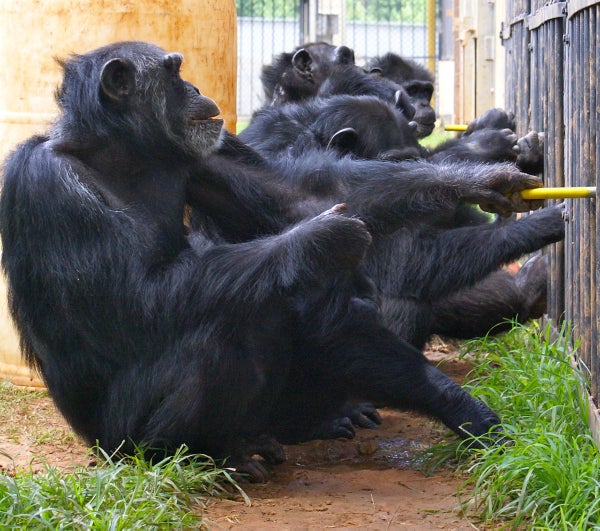Although humans love the playful ways and toothy grins of chimpanzees, our primate cousins have the reputation of being competitive, churlish and, at times, aggressive.
New research published today in Proceedings of the National Academy of Sciences suggests that despite being prone to occasional violent behavior, chimps actually much prefer cooperating over competing. In fact, the work shows that chimps work together at similar rates as humans—and that when violence does occur among apes, it is often directed toward an individual that is not being a team player.
Working with 11 chimps housed in a large outdoor enclosure at the Yerkes National Primate Research Center at Emory University, researchers devised an experiment to assess cooperation, defined as two or more chimps working together to access a food reward. Initially two chimps had to team up, with one lifting a barrier and the other pulling in a tray baited with small pieces of fruit. Once cooperation between two subjects was established, another barrier was added, requiring a third chimp to pitch in if all three were to obtain the spoils.
On supporting science journalism
If you're enjoying this article, consider supporting our award-winning journalism by subscribing. By purchasing a subscription you are helping to ensure the future of impactful stories about the discoveries and ideas shaping our world today.
Given that the apes had nearly 100 hours to obtain their reward in the presence of bystander chimps, there were plenty of chances for competition to arise. The authors defined “competition” as episodes of physical aggression, bullying a fellow chimp to leave the scene of the reward or freeloading—stealing the prizes of others without putting in the work of retrieving them.
Although the study only looked at a small number of individuals, the results were telling. In 94 hour-long test sessions, the chimps cooperated with one another 3,565 times—five times more often than they were in competition. In addition, the animals used a variety of strategies to punish competitive behaviors, such as preferentially working with their more communal and tolerant fellow animals.
When aggression did occur, it was often used to subdue the overly competitive or prevent freeloading, perhaps an even greater affront to the chimpanzee honor code. Attempted thefts by those who did not put in the work were not well received. In fact, the researchers even observed 14 instances in which a third-party chimp—typically one of the more dominant of the bunch— intervened to punish freeloaders. “It has become a popular claim in the [scientific] literature that human cooperation is unique,” study co-author Frans de Waal, a primatologist at Yerkes, said in a statement. “Our study is the first to show that our closest relatives know very well how to discourage competition and freeloading.”
Plenty of other species exhibit cooperative behaviors—take for example the enviable coordination of ants building a subterranean metropolis. But as lead author and Canisius College psychologist Malini Suchak explains, what her team observed in chimps is even more impressive. “Although cooperation is widespread across species, cooperation in ants, for example, as well as in many other species is directed toward kin and is basically preprogrammed,” she says. “Our study shows that chimpanzees are really thinking about cooperation and actively making decisions that maximize cooperation and minimize competition.” She adds: “Cognitively, what they did in our experiment is much closer to what humans do when we cooperate than it is to what ants do when they cooperate.”
Michael Tomasello of the Max Planck Institute for Evolutionary Anthropology, a pioneer in this area of research who was not involved in the study, pointed out in an e-mail that the new work does have limitations beyond just its small size. Tomasello’s past work has shown that when given the option to work together to obtain food versus working solo, chimpanzees actually prefer to go it alone, a trait that distinguishes them from humans. The chimps in Suchak’s study were free to roam their Yerkes enclosure and had access to their usual “primate chow,” but in the wild they may have chosen to freely forage by themselves instead of cooperating to obtain food, Tomasello believes.
Still, mounting evidence supports the notion that other primates are perhaps more like us than previously thought. Earlier work by Suchak, de Waal and colleagues published in 2014 found that chimpanzees living in socially rich and complex settings spontaneously joined forces with their roommates. Beyond apes, last month Scientific American reported on research showing that monkeys, like humans, become more socially selective with age, preferring to spend time with their “friends” over other monkeys.
Unfortunately, great apes may share our more concerning qualities as well: Chimpanzees in nature will frequently form alliances with one another so they can compete more effectively against others. Field work in Uganda by University of Michigan anthropologist John Mitani found that every few weeks the males in a particular chimp community assemble single-file and carefully scope out neighboring territories. If not outnumbered, the trespassers will stage a siege in hopes of winning new territory.
Collaborative chimps, cranky old monkeys, mass conflict—in our simian relatives we increasingly see a reflection of ourselves. As Suchak points out, her new findings imply that the origins of our cooperative behaviors—those rooted in developed senses of tolerance and trust and, at times, reward through coordinated violence—may go farther back than previously thought. “In the past, chimpanzees have been characterized as overly aggressive and competitive, which resulted in people suggesting human cooperative behavior evolved relatively recently and is somehow distinct from cooperation observed in other species,” she says. “Our findings are a reminder that humans are animals, after all.”
